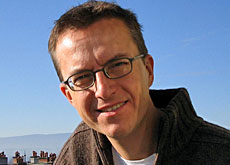
Naturalisation is a step towards integration

Migration expert Etienne Piguet tells swissinfo why he is in favour of using language tests but not citizenship tests as part of the Swiss naturalisation process.
Piguet, from Neuchâtel University, says that speaking the language, a good education and access to the job market are the most important factors behind successful integration.
Piguet’s comments come after Swiss citizens turned down two federal proposals to ease citizenship requirements for second and third generation foreigners eighteen months ago.
Switzerland has one of the lowest levels of naturalisation in Europe. Foreigners currently number 1.5 million – about 20 per cent of the population.
swissinfo: What is your definition of integration?
Etienne Piguet: It’s all about participating: being a member of society, whether it’s in the workplace, at school or when taking part in cultural activities.
Political participation is also an important aspect – something that is made possible by granting citizenship and allowing foreigners to vote.
swissinfo: Is Switzerland on the right track in terms of integration?
E.P.: Things seem to work. Over the past 50 years, Switzerland has been the main country of immigration in Europe.
swissinfo: Why is it that with its high percentage of foreigners Switzerland does not have ghettos like in France or Germany?
E.P.: That’s partly because Switzerland’s cities are relatively small. But the biggest factor is the geography of the job market. Foreigners, many of whom are seasonal workers, are employed in tourism-related jobs in agriculture and in the construction and catering industries, but not only in cities.
Higher unemployment among foreigners compared with the Swiss is a relatively new phenomenon here in Switzerland. In the 1960s and 1970s it was quite low as foreigners couldn’t work in Switzerland without a contract.
If they lost their job they had to leave the country. This is what over 100,000 Italians had to do in the 1970s. But it’s no longer the case. However, if the unemployment situation among foreigners gets worse, there could be integration problems.
swissinfo: Some European countries go further than testing language skills by carrying out citizenship tests for naturalisation. Can such measures guarantee successful integration?
E.P.: These kind of cultural tests, which are carried out in a number of countries, were used here in Switzerland back in the 1960s and 1970s. A number of Swiss communes still use them.
By and large we have stopped these rather odd tests. I would be surprised if they were reintroduced here.
To encourage integration, countries impose certain preconditions. Language can be an objective yardstick. But it’s much harder when you start looking at issues that are subjective, or involve certain groups of people, such as polygamy, male-female relationships or the wearing of headscarves. Anyone seeking citizenship can simply learn the right answers by heart.
swissinfo: Do you think that issues such as the banning Muslim teachers from wearing headscarves in public schools reinforce feelings of racism towards Muslims?
E.P.: Of course, we hear this kind of criticism. But issues like the wearing of the veil or forced marriages shouldn’t be taboo. We need to be able to communicate with candidates [for naturalisation] about certain values, such as the Swiss constitution, but not via a test.
swissinfo: Is the tougher naturalisation process a reaction to recent terrorist attacks? Is it out of fear of an “Islamisation” of Swiss society?
E.P.: I think it’s more symptomatic of our fears than an integration tool. This is not how we are going to improve things. Access to the job market and language are methods of integration that work.
We have to stop creating groups that become marginalised by society. It’s probably more effective to naturalise a couple that has a traditional view of the roles of men and women than to marginalise them. And of course there are also Swiss couples that don’t have very egalitarian relationships.
swissinfo: Should we introduce standard naturalisation testing in Switzerland or is naturalisation something only for the communes to deal with?
E.P.: In 2002 we carried out a study in the communes into naturalisation that revealed huge differences. In some places a Turk who is already well integrated has no chance of becoming naturalised, while in others it’s no problem at all.
To be fairer, we urgently need to introduce standardised testing and the possibility for people to appeal.
swissinfo: Does naturalisation guarantee successful integration?
E.P.: Of course not. It’s a step towards integration but not the crowning achievement of the whole process. For a foreigner it’s an incentive.
swissinfo-interview: swissinfo
People who have been resident in Switzerland for 12 years may apply for naturalisation.
Switzerland grants citizenship to people who are well integrated and comply with the Swiss rule of law.
Applicants are naturalised by Swiss cantons and communes. The procedure can vary considerably.
In 2004 the Swiss people rejected a simplified naturalisation procedure for second- and third-generation foreigners.
In 2005, 39,753 naturalisations were registered – a record for Switzerland.
There are 1.5 million foreigners currently living in Switzerland, out of a total population of seven million people.
Etienne Piguet was born in Montreux, canton Vaud, in 1966.
He studied economics in Lausanne.
He has been a professor at the Institute of Geography at Neuchâtel University since 2001.
He is an expert in migration and integration.
He has published several books on migration and integration issues.

In compliance with the JTI standards
More: SWI swissinfo.ch certified by the Journalism Trust Initiative
















![The four-metre-long painting "Sonntag der Bergbauern" [Sunday of the Mountain Farmers, 1923-24/26] had to be removed by a crane from the German Chancellery in Berlin for the exhibition in Bern.](https://www.swissinfo.ch/content/wp-content/uploads/sites/13/2025/12/01_Pressebild_KirchnerxKirchner.jpg?ver=1af8ac75)














You can find an overview of ongoing debates with our journalists here . Please join us!
If you want to start a conversation about a topic raised in this article or want to report factual errors, email us at english@swissinfo.ch.